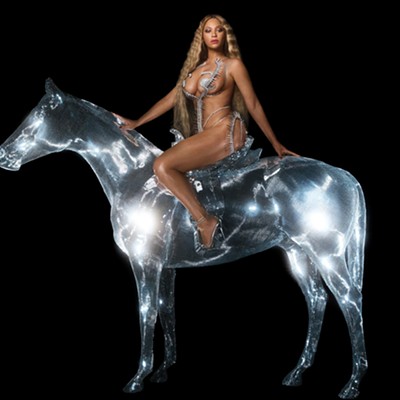
Detroit rapper Danny Brown is back on our collective radar, this time with a new album and a massive tour — which hits Spokane Friday — to promote it.
With him comes a wave of glowing reviews for Atrocity Exhibition, Brown's fourth album and first for the influential Warp Records label. Rolling Stone gave it four stars and called it "the year's most thrilling cry for help." The Guardian went one star better and christened Brown the "true successor" to OutKast.
And there's much to love here. After releasing his underground debut in 2010, the MC broke out in 2011 with XXX, a sprawling collection of strange bangers that introduced Brown's unique style to the masses — manic rat-tat-tat raps about various vices set against noisy, industrial beats, which sounds like nothing else in hip-hop.
Brown followed XXX with 2013's Old, delivering more of the same, plus a healthy dose of EDM-flavored tracks and higher-profile guests like A$AP Rocky, Purity Ring and Charli XCX. At first glance, Old seemed like evidence that outsiders were starting to loosen Brown's vice grip on his own vision, but repeated listens proved that, in fact, it was Brown's vision that outshined the add-ons.
On Atrocity Exhibition, that vision comes into its sharpest focus yet. On opening track "Downward Spiral," Brown's longtime producer Paul White doubles down on the noise, providing a clunky, clangorous backdrop for the rapper's most harrowing lines yet: "Everybody say, you got a lot to be proud of / Been high this whole time, don't realize what I done / 'Cause when I'm all alone, feel like no one care / Isolate myself and don't go nowhere."
Within seconds, Brown is "drowning frustrations in an ocean of sin" and feeling like he lives day to day on Death Row. That's the common thread throughout Atrocity Exhibition. In "Rolling Stone," Brown laments that he "bought a nightmare, sold a dream" and "happiness went upstream." In "Ain't It Funny," there's "panic when the drugs are gone and nobody is answering." In between, Brown relentlessly unleashes one playfully bizarro couplet after another, with White's post-apocalyptic doom-bap almost always by his side.
After an impressive run of "grappling with drug use" songs, Brown tries to find peace in the album's closer, "Hell For It." As he sees it, his task is twofold: to "inspire your future with my past," and to leave behind a legacy in song.
But after 45 minutes of searching and self-loathing, he must convince himself he's worthy of those jobs.
"Never got deterred from the voice I heard inside," Brown squawks over a seesawing piano sample. "Tell myself every day: The greatest that's alive."
You could argue that point. Certainly there are rappers (named Kendrick, Kanye, Chance or otherwise) who'd argue. But Danny Brown's in the conversation. ♦
Danny Brown with Maxo Kream and Zelooperz • Fri, Oct. 7, at 8:30 pm • $20 • All-ages • Knitting Factory • 919 W. Sprague • sp.knittingfactory.com • 244-3279















